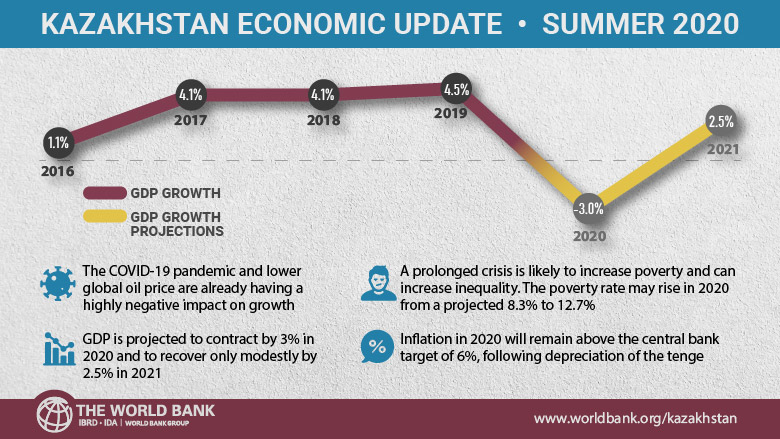The Kazakhstan Economic Update is a semiannual report that analyzes recent economic developments, prospects, and policy issues in Kazakhstan.
Download the full report — Kazakhstan Economic Update, Summer 2020: Navigating the Crisis

The Kazakhstan Economic Update is a semiannual report that analyzes recent economic developments, prospects, and policy issues in Kazakhstan.
Download the full report — Kazakhstan Economic Update, Summer 2020: Navigating the Crisis
The COVID-19 pandemic is the biggest shock to Kazakhstan’s economy in almost two decades, and is already having a highly negative impact on growth. While the collapse in oil prices in 2009 and 2015 shrank aggregate demand and rocked the stability of the financial sector, the current crisis has meant that the supply side of the economy is also affected by a series of lockdowns. These measures, which were necessary to contain the pandemic, are especially disruptive for businesses which rely on physical presence and face-to-face transactions.
The Kazakh government acted early to contain the spread of COVID-19. Following the announcement of a state of emergency, a state commission was set up to coordinate the efforts to fight the pandemic, impose quarantine control, and provide support to those people whose livelihoods were affected by the coronavirus or by the emergency restrictions.
The authorities also introduced a fiscal package to provide support to firms and households affected by the crisis. This effective approach to control the pandemic and improve access to health services should be continued and strengthened. But deployment of resources and reforms are also needed for Kazakhstan to navigate out of the crisis.
The authorities may want to redeploy some resources from state programs toward improving access to better education and healthcare, and for temporarily supporting workers and employers. Having a medium-term reform program can also help leverage resources from the private sector and better enable it to adjust and respond to new opportunities.
The impact of fiscal and monetary stimuli on recovery will be tested by a protracted pandemic and prolonged slump in the global economy. The disruption in supply chains and unresolved tensions in global trade can further complicate the sourcing of inputs.
The stimulus package can restore economic growth only after the pandemic recedes. Therefore, it is projected that GDP will contract by 3 percent in 2020 and will recover only modestly by 2.5 percent in 2021.
Inflation pressure is expected to remain through the end of 2020, but will slow as the effect of exchange rate depreciation gradually dissipates. Inflation this year will remain above the central bank target of 6 percent, following depreciation of the tenge.
The current account deficit is expected to widen to above 5 percent of GDP in 2020, in large part owing to deteriorated terms of trade and decline in volume of oil exports.
A prolonged crisis is likely to increase poverty and can increase inequality in Kazakhstan. Preliminary estimates suggest that the poverty rate may rise in 2020 from a projected 8.3 to 12.7 percent – equating to more than 800,000 additional people living in poverty.
The shock to Kazakhstan’s labor market, due to both the pandemic and the mitigation measures, has severe implications for employment, particularly sectors that employ low skilled workers. Unequal access to quality education, especially during lockdown, can negatively impact human capital development for the poor.
Learn More – Download the full report. The report is also available in: Kazakh, Russian.